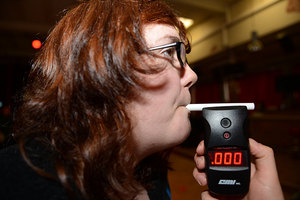From employment prospects to insurance rates, being caught driving under the influence can have lasting consequences.
By QuinStreet Fri 1:32 PM On Sept. 3, 2013, San Francisco opened a seismically safe eastern span of the Bay Bridge. Not two hours later, the California Highway Patrol made its first DUI arrest on the bridge.
Whether it’s called driving under the influence (DUI), operating while intoxicated (OWI) or driving while intoxicated (DWI), drunk driving is a nationwide problem of seismic magnitude. A majority of states use .08 percent as the legal level of intoxication for adults.
According to the National Highway Traffic Safety Administration, an estimated 10,228 people died in drunk driving crashes in 2011, accounting for 31 percent of all traffic deaths that year.
Since NHTSA began recording alcohol-related statistics in 1982, drunk driving fatalities have decreased 52 percent, from 21,113 in 1982, in large part because of public awareness campaigns and tough nationwide laws. Nonetheless in 2011, Florida’s Department of Motor Vehicles alone still recorded 33,625 DUI convictions.
“Drunk driving is incredibly serious,” says Benjamin Luftman, a DUI attorney at Luftman, Heck & Associates in Columbus, Ohio. “In Ohio, you can’t expunge or seal a conviction of DUI. It’s on your record for life.”
And a DUI can haunt every aspect of someone’s life, from employment to insurance rates.
“I strongly believe that a DUI conviction can be a bar to employment. I usually explain that if an employer has 10 qualified applicants for a position, does a background check and one of them has a DUI conviction, that person will likely be amongst the first cut. That is especially true in as competitive a job market as we have today,” says Luftman. DUI punishment
Ohio’s OVI (operating a vehicle under the influence) penalties are particularly harsh. A first offense gets you a possible three-day jail stint, a 72-hour intervention program (usually held in an area hotel), a three- to six-month license suspension and fines of $375 to $1,075. Blow over .17 on a breathalyzer test and your jail time is mandatory — and you’ve bought yourself a specialized bright yellow DUI license plate for your suspension period that lets everyone know you got a DUI.
Upon a second offense in Ohio, you get a mandatory ignition interlock, which costs up to $200 for installation and $80 per month maintenance. It uses a breathalyzer system that’s connected to the vehicle’s engine that’s required to start the car and keep it running. If alcohol is detected the car won’t start or will disable in motion. Currently 36 states have ignition interlock system laws.
Refusing to blow
So why not refuse the breathalyzer? Here’s why: The majority of states have some type of “implied consent” law.
“This means that when you sign up for your driver’s license, you also consent to taking a breathalyzer test upon demand from a police officer,” says Eric Misterovich, a DUI attorney at Newburg Law in St. Joseph, Mich.
Many times people refuse a breathalyzer because they don’t want to provide evidence of their blood alcohol to police out of fear of being arrested. However, the penalty for refusing the breath test can be harsher than the OWI charge, says Misterovich.
“A first-time OWI charge in Michigan is a misdemeanor punishable by 93 days in jail, $2,500 in various fines, six points on your record and a 30-day license suspension with an additional 150 days of a restricted license,” he says.
The majority of first-time offenders are not sentenced to jail; rather, they are given probation, fines and license restrictions.
However, if you refuse to take a breathalyzer or refuse to take a chemical rights test in Michigan (but in some states called chemical test rights), you are subject to an automatic license suspension of one year and given six points on your record, among other penalties. “Worse, even if you refuse the chemical rights test, the police will be able to obtain a warrant to draw your blood,” says Misterovich.
The one-year license suspension will likely have a greater impact on your life than an OWI charge. Plus, given the police’s ability to draw your blood anyway, you could still be charged with OWI.
“In short, at least for first-time offenders where there is no car accident or bodily injury, refusing to take a breathalyzer will likely subject you to greater penalties than the OWI” in Michigan, says Misterovich.
On the flip side, “from an evidentiary perspective, no breath test means an attorney may be able to argue away the subjective evidence,'” says Luftman. All that’s left is how you appeared at the time of your arrest, what you said, how you smelled, and the officer’s opinion of your field sobriety tests. You may be able to argue away those things.
Every DUI case is different and many variables — from your past driving history, the judge assigned to your case — and even the courtroom you’re in — play a role, as well as your attorney.
Did we mention you’ll likely need an attorney? Luftman says he doesn’t twist anyone’s arm to retain one, but it’s advisable. Attorney fees will rack up your total drunk driving experience to the tune of $1,500 to $10,000. But an attorney can help minimize penalties, sometimes avoid a DUI conviction and/or may get you an amended charge such as reckless driving.
Drunk driving laws across the country
Interestingly, Mississippi has no law that prohibits operating a motor vehicle while possessing an open container of alcohol in the vehicle. Yet 24 states have DUI laws that apply directly to bicycles. Alaska has the highest minimum fine for a first offense at $1,830, while Colorado has the highest minimum jail time for a first offense (seven days). In New York, Oklahoma and Indiana, a second offense is a felony and 25 states including Ohio require vehicle forfeiture after multiple drunk driving offenses.
Forty-two states suspend licenses for first-time offenders. An SR-22 form is required to reinstate driving privileges after a DUI in most states. The form, which must be carried for three years, also puts offenders in a high-risk insurance category and raises rates by at least 30 percent.
Source: MSN


Recent Comments